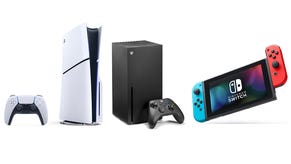Nintendo getting its mojo back
Weekly Roundup: The house of Mario has been steadily gaining momentum, but will it last?
I was prepared to write all about virtual reality once again, despite the fact that my colleague Brendan Sinclair did a fine job of it last week, but then I woke up today to see Nintendo's appearance on The Tonight Show with Jimmy Fallon and it got me thinking about the company's future.
Before I dive into it, the one thing I'll say on VR is that I'm encouraged by moves that bring about unity. With the Global Virtual Reality Association pushing for solidarity and open standards, and the discovery this week following the launch of Oculus Touch that Rift with Touch can support most SteamVR titles, developers should find it easier to target the combined (albeit still limited) installed bases of the PC VR platforms. Game makers in the VR ecosystem need all the help they can get.
Onto Nintendo, the company is quite possibly on the cusp of a major comeback after a miserable few years with its worst performing console in history, the Wii U. Watching as an excited audience witnessed Shigeru Miyamoto play the Mario theme along with The Roots, followed by Reggie Fils-Aime demoing both Super Mario Run on iPhone and The Legend of Zelda: Breath of the Wild on Switch reminded me that there's still quite a lot of goodwill for Nintendo and its highly valuable IP. Now it's up to the company to actually capitalize on that excitement. The rise of Pokemon Go, which helped jumpstart Pokemon Sun and Moon to become Nintendo's fastest-selling titles ever in Europe and the Americas is just the start.
The NES Mini microconsole has been continually selling out at retail, feeding into nostalgia for NES classics while people eagerly await the launch of the first ever Mario game for smartphones, Super Mario Run. The game, which quickly saw 20 million people sign up to be notified about its release, will be a fascinating test for the mobile market given its $9.99 price point and for Nintendo, which hopes that both lapsed gamers and new players will come to appreciate the Italian plumber and seek out deeper and even more engaging experiences -- on the Switch of course.
"Super Mario Run is going to introduce millions of more people to the fun of Mario, and it'll become the entry point for them," Miyamoto told The Verge. "And then the question becomes, once you've gone through that entry point, then what comes next? Is it a more traditional Mario experience? Is it something like the Mario Galaxy games? We'll then have to look at what it is these new fans want from a Mario game, and we'll continue to see Mario evolve in that way."
Miyamoto and Nintendo may be a bit too optimistic to think that everyone who picks up Super Mario Run will want to run out and spend several hundred dollars more on a dedicated gaming platform plus software, but I'm convinced that a certain portion of the Super Mario Run audience will do just that. Another, possibly much larger, portion of that audience, however, could very well decide that Super Mario Run is fantastic and they'd simply like more experiences like that from Nintendo on smartphones. Either way, that's great news because it means Nintendo has vastly expanded its audience.
"Frankly, I think the future is once again starting to look quite bright for Nintendo. The next critical step for the company is to absolutely get its marketing message right as it moves forward"
In a sense, the Switch will become the "niche" product for the hardcore Nintendo fan, while mobile will ultimately become where Nintendo reaches the majority of players. If the lion's share of revenues for Nintendo begin to come from mobile, it'll pose a very interesting question about the future of hardware like Switch, but as long as people crave in-depth games like Breath of the Wild, Nintendo will find a way to make them, regardless of platform.
Frankly, I think the future is once again starting to look quite bright for Nintendo. The next critical step for the company is to absolutely get its marketing message right as it moves forward. All the love and excitement Nintendo engendered with the Wii was squandered with the Wii U, but now the company has a legitimate chance to see a real domino effect take place, with each piece pushing the next forward - Pokemon to Super Mario Run to Switch and Zelda, etc, etc.
What needs to happen from now through next March when the Switch launches is an all-out assault on the media; mainstream news, talk shows, social networks, and more. What Nintendo achieved with Jimmy Fallon this week was pure marketing brilliance, and it's that sort of approach that catapulted the original Wii to stratospheric heights in 2006. The Wii didn't succeed because IGN or GameSpot thought it was cool; it took off because everyone from The Wall Street Journal to the New York Times to Bloomberg wrote glowing things about it. Nintendo's appearance on Fallon could perhaps be the start of a new media blitz; it needs to be if Nintendo wants to reclaim its place atop the industry.
We'll see how the next domino piece tilts in one week when Super Mario Run launches. "This is definitely a defining moment for Nintendo," Yoshio Osaki, president of IDG Consulting Inc, told The Wall Street Journal. "If Mario can't get the job done, I don't know what other character could."
Other news on GamesIndustry.biz this week:
Dean Hall on VR: "There is no money in it"
Vivendi stake in Ubisoft passes 25%, increasing takeover threat
PlayStation 4 worldwide sales surpass 50m
Sony mobile push begins with Hot Shots Golf, PaRappa
Apple names Clash Royale its iPhone GOTY, Reigns is Runner Up
Final Fantasy XV is the second fastest selling game in franchise history in the UK










